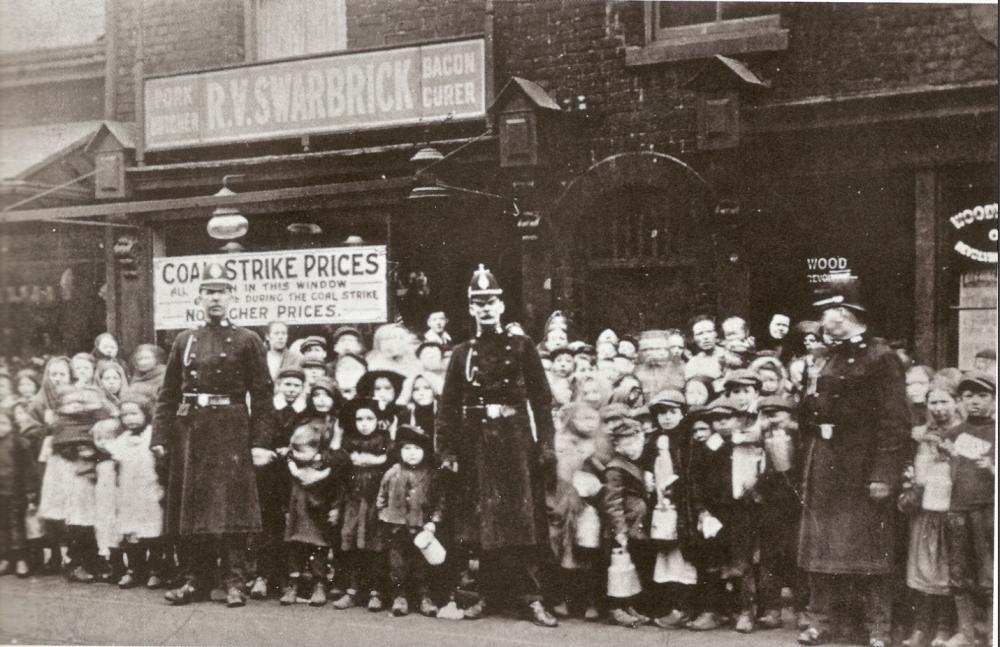Wigan Album
SOUP KITCHEN
10 Comments
Photo: Keith
Item #: 23686
I have seen this book and I would encourage anyone to read it. Some of the things in it are heartbreaking like the little lads of seven years old who worked down the mines and were battered every day and the children who worked in the cotton mills from seven years of age and were also ill treated. In 1800, a law was passed that no child under the age of 9 could go to work. There were no schools then so they had to add to the income for the family.
Here's what I have read. Wigan had a number of coal strikes over the years, in 1853 there were riots, akin to our inner city ones today. The bitterest one was in 1881 when the weakness of the numerous local unions, who only represented the better paid hewers, meant that the majority of the strikers, who were unskilled non-union men, earning low wages and without union funds to support them, saw their only chance in having a short strike. This feeling that the strike had to be won quickly resulted in much violence, from which the unions tried to dissociate themselves. The strike also took place in bitterly cold weather which increased the strikers suffering.
Judging by the way the children are dressed, this photo could have been taken at the time of the 1912 National Miners Strike.
I'm an old ex-Wiganer but can somebody tell me just where this pic was taken?
it,s like that now . it,s called a food bank.
Yeah, just like that now “whups”, but at that time starvation and deprived living conditions were just that - compared with today’s handouts being eaten in front of the families large HD tv, centrally heated, double glazed home - get real.
i am real , just another narrow minded comment from another tory no doubt.
In 1912 Wigan had around 10,000 miners the majority probably not in a Union, free school meals had not become compulsory, a working man, not his family, could expect in today’s terms 31 shillings a week (i.e. roughly £35 in today’s terms) for himself, nothing for his family, no matter what size, and only for a maximum of 15 weeks in the year. This measure had only been introduced the year previously in 1911.
Poverty rates amongst people from working class households were 15 to 18%. it rose to over 60% of families with more than three children and an unskilled head that were below the poverty line. Regular work before the first World War was not sufficient to protect families against poverty.
Here’s a flavour of how poverty was lived in those days…..
“A family in poverty must never spend a penny on railway fare or omnibus. They must never go into the country unless they walk. They must never purchase a halfpenny newspaper or spend a penny to buy a ticket for a popular concert. They must write no letters to absent children, for they cannot afford to pay the postage. They must never contribute anything to their church or chapel, or give any help to a neighbour which costs money.
They cannot save, nor can they join a sick club or Trade Union, because they cannot pay the necessary subscriptions. The children must have no pocket money for dolls, marbles or sweets. The father must smoke no tobacco, and must drink no beer. The mother must never buy any pretty clothes for herself or for her children.
As for the family diet being governed by the regulation, “nothing must be bought but that which is absolutely necessary for the maintenance of physical health, and what is bought must be of the plainest and most economical description.” Should a child fall ill, it must be attended by the parish doctor; should it die, it must be buried by the parish. Finally, the wage-earner must never be absent from his work for a single day.”
When I look at that queue in the photo again I wonder just what their lives were really like. Yes we have folk who are needy today and attendance at food banks may be rising but surely no comparison with the sheer scale in terms of numbers or degree of anguish, thank goodness, compared to 100 years ago.
A lot can be said against the abuses of our benefit culture but at least we have the net in place, some of those in the photograph could easily be in free fall with insufficient help to alleviate their distress, perhaps the ones at most risk were not even in the queue.
Sorry, I should have said "a working man who became unemployed could expect 31 shillings a week for himself and family, but no support from Union if he wasn't a member"
Blimey! I've just worked out what that means i.e. it averages £10 a week in today's terms, if you were out of work for the year and you were an unskilled man and so probably not in a Union (no support), no matter what size your family! How could anyone cope, starvation wasn't an option it looks as if it was compulsory.